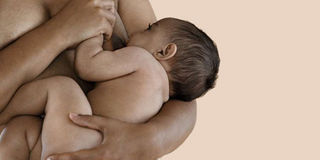Promote breastfeeding at the workplace

Breastfeeding or nursing is a delightful moment not only for the baby but the mother too. It is the most satisfying and safest source of nourishing the little ones. PHOTO | FILE
What you need to know:
Young mothers should be encouraged to breastfeed anywhere and anytime, if there are no private rooms nearby.
There is an absurd mentality that associates breastfeeding with nudity, yet it is for the benefit of our future generation.
To the mother, breastfeeding decreases the risk of mothers developing breast cancer, ovarian cancer, Type 2 diabetes, and heart disease.
It is estimated that increased breastfeeding could avert 20,000 maternal deaths each year due to breast cancer.
As the world winds up the World Breastfeeding Week, which is an annual celebration between August 1 and 7, I take great pride in Kenya’s remarkable growth in exclusive breastfeeding.
According to the Kenya Demographic and Health Survey, in 2015, 61 per cent of mothers practised exclusive breastfeeding — a drastic improvement from 13 per cent in 2003.
CHILD SURVIVAL
This success story can be attributed to the government’s deliberate and systematic strategies and policies in promoting exclusive breast feeding among mothers.
In fact, Kenya remains one of only a handful of countries that have been able to meet the World Health Assembly target of increasing exclusive breast feeding to 50 per cent by 2025.
However, we still fall short of the WHO recommended 80 per cent, which is required for optimal child survival, growth and development. With the enormous benefits that breastfeeding confers to both a child and the mother, we can make history by ensuring that at least 80 per cent of our mothers practise exclusive breast feeding. This alone, The Lancet reports, can save more than 800,000 lives of children under six months annually.
Some of the benefits of exclusive breastfeeding are that breast milk contains the perfect balance of nutrients that the baby needs in its first six months of life that are easily and efficiently digested and metabolised.
Secondly, it provides protection against allergies and diseases. Thirdly, it aids in the baby’s cognitive, physical and motor development, and lastly, it promotes bonding between the baby and the mother.
To the mother, breastfeeding decreases the risk of mothers developing breast cancer, ovarian cancer, Type 2 diabetes, and heart disease. It is estimated that increased breastfeeding could avert 20,000 maternal deaths each year due to breast cancer.
PRIVATE ROOMS
In order to address this gap, and increase the percentage of exclusive breast feeding women to 80 per cent, we need to fully support the government’s interventions of the Baby Friendly Hospital Initiative and the Baby Friendly Community Initiative. One promotes breastfeeding in hospitals at the time of delivery and the other breastfeeding in the community. Health workers are aggressively and efficiently creating a Baby Friendly Hospital Initiative. We have to complement their efforts in promoting a Baby Friendly Community Initiative.
Some Kenyan companies have done it. They have well-equipped private rooms where breastfeeding mothers can express and store their milk. The result is cultic admiration, loyalty and respect from staff that’s best reflected by their balance sheets. They are worth emulating.
Secondly, young mothers should be encouraged to breastfeed anywhere and anytime, if there are no private rooms nearby. There is an absurd mentality that associates breastfeeding with nudity, yet it is for the benefit of our future generation. It’s every patriot’s role to educate society to get rid of such unfortunate mindset and beliefs.
Ms Muketha is a nutritionist and founder of Tule Vyema. Email: [email protected]



